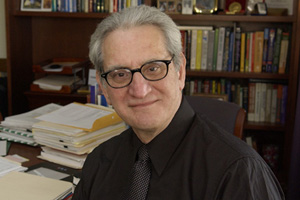 |
|
||
|
|||
Math and stats prof D’Agostino leads dissent at FDA panel hearings on painkillers
By Noah Shaffer
|
|
Ralph D’Agostino Photo by Kalman Zabarsky |
|
Food and Drug Administration panel hearings typically don’t make for exciting television. But last month millions of arthritis patients tuned in nervously to news coverage of an expert committee’s three-day scrutiny of painkilling drugs. Vioxx, Celebrex, and Bextra, COX-2 inhibitors once considered miracle cures for arthritis, had been shown to substantially increase the risks of a heart attack or stroke. Inside the FDA, debate raged over whether the drugs should be on the shelf.
Celebrex manufacturer Pfizer, whose sales of the drug amounted to $3.3 billion last year, began the February 15 meeting in Washington, D.C., by telling the group of outside experts that Celebrex is as safe as ibuprofen.
But when panel member Ralph D’Agostino examined the company’s data, he didn’t like what he saw. “It was too optimistic,” says the CAS and GRS mathematics and statistics professor, who knew that other existing studies contradicted Pfizer’s findings. He was especially concerned that Pfizer’s study had given “patients either Celebrex or a placebo and followed them to see if they’d have a cardiovascular problem, like a heart attack. But if patients were having a problem like high blood pressure, they’d take them off the drug and only follow them for 14 more days.”
So D’Agostino asserted that “you have to follow them until the end of the study, because rising blood pressure is a sign they could develop a cardiovascular disease.” Those are the types of questions, he says, “that the statistician asks, when no one else is asking them.”
At the end of the hearings, D’Agostino voted to allow low- dose Celebrex to remain on the market, as did all but one of his colleagues on the 32-member panel. “Both the risk and the dose were low,” he says. He did vote, however, against reinstating sales of Vioxx, which had been voluntarily pulled by maker Merck last September, and to take Bextra off the market. Vioxx and Bextra were barely approved, with 17 of the 32 voting to allow them to be sold. Substantial restrictions on the marketing of Vioxx were recommended should Merck decide to sell it again, and further research was suggested for all three.
One of three statisticians on the panel, D’Agostino believes that the pharmaceutical giants were not “trying to be deceptive, but their presentations were rosy,” he says. “There were data on these drugs that wasn’t included in their presentations, and it is the job of the statistician to make sure the full spectrum of data is available to the panel.”
D’Agostino, who directs the CAS statistics and consulting unit and has served on FDA panels since 1974, wasn’t surprised that the votes on Vioxx and Celebrex were close. “You had the public health concern running up against the concerns of the physicians who see patients with arthritis,” he says. “Without these drugs, many of these patients would remain incapacitated. With the drugs, the arthritis is relieved and there is no gastrointestinal problem, but there is the risk for cardiovascular disease. Looking at the individual patient, it might be worth the small risk, but looking at the general public health, the risk becomes huge when a lot of people are taking these drugs.”
In the details
The role of the statistician on an FDA expert committee reviewing facts is to make sure the data is being viewed correctly. D’Agostino says that also includes looking at whether the appropriate populations have been surveyed and ensuring that high-quality data addressing the question at hand has been collected. “It is a broad role,” he says.
Questions about whether the FDA has been sufficiently open about past research have led to an ongoing Senate investigation, but FDA officials insist the agency is moving into a new era of transparency in its drug reviews. D’Agostino agrees that the FDA is heading in the right direction, and he adds that all panel discussions are now made part of the public record. “Everything is so out in the open,” he says, “I can’t even talk about it to my fellow panel members over lunch.”
Following the panel’s votes on the COX-2 inhibitors, the Center for Science in the Public Interest released a report alleging that 10 committee members had ties to the pharmaceutical industry. D’Agostino, who was not one of those 10, says he had been on a Pfizer scientific panel for an unrelated drug and was granted a waiver by the FDA so he could serve on the arthritis painkiller and drug safety panel. “Almost everyone on the panel had worked with major drug companies at one time or another, because they are the ones who fund the major cardiovascular studies,” he says. “I still voted against selling Vioxx and Bextra.”
As well as working with the FDA, D’Agostino is a senior statistician for the federally funded Cardiovascular Outcomes in Renal Atherosclerosis Lesions (CORAL) study on whether placing metal stents in patients with renal artery problems can stop clogging in the artery. In addition, D’Agostino is co–principal investigator of the NIH-funded and BU-administered Framingham Heart Study, which contains detailed medical records of 10,000 Framingham residents over the past five and a half decades and examines, among other things, potential connections between vascular risk factors and Alzheimer’s.
Not all of D’Agostino’s activities are related to medicine, however. He worked on the 2000 edition of the Places Rated Almanac, which raised some eyebrows when it ranked oft-maligned Cleveland as the second best U.S. city to live in, in terms of recreational activities. “Statisticians have broad training,” says D’Agostino, who won the 1985 Metcalf Cup and Prize, BU’s highest teaching award. “We can move from one field to the next.”
![]()
11
March 2005
Boston University
Office of University Relations
